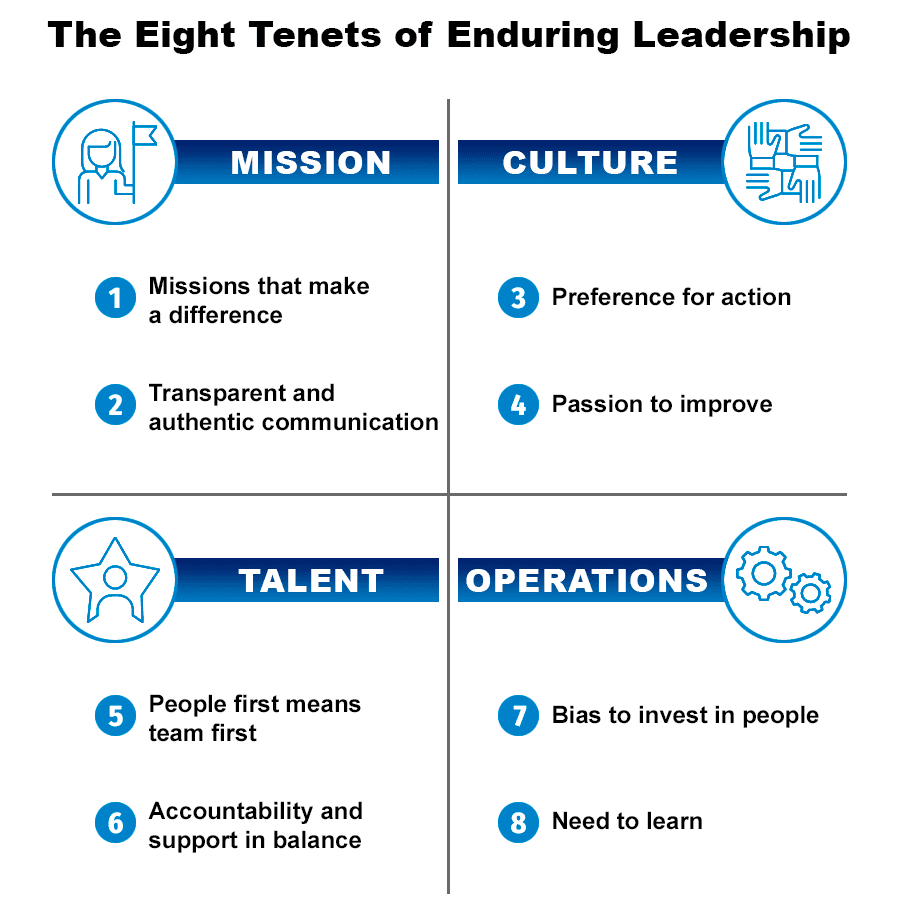Eight Tenets for Revenue Leaders
Promoting Sustainable Growth through Enduring Leadership
What are the key leadership traits of companies that consistently grow top-line revenue over not just years, but decades? The Alexander Group’s new research on Enduring Leadership explores key factors that drive long-term business health, resilience and growth.
The pandemic recently proved that it is possible to grow sustainably and profitably during periods of economic struggle, but only with the guidance of compelling and thoughtful leaders to navigate the way ahead. Exemplifying Enduring Leadership principles is essential to fostering successful businesses that stand the tests of time.
To further explore the topic of Enduring Leadership, Alexander Group has identified 450 companies with the highest levels of sustainable growth and profitability based on a quantitative analysis of firms’ annual financial reporting over the past 20 years (2001-2021) and conducted an initial survey of top commercial and C-suite leaders from a varied subset of these organizations to attempt to narrow down the key tenets of Enduring Leadership among top-performing companies.
Research on this topic has just begun; throughout 2022, we’ll continue to analyze top performing companies, trying to better understand, quantitatively and qualitatively, what truly drives them to succeed over the long term.
This article lays out findings from the initial research, structured into eight important tenets of Enduring Leadership. These eight tenets are organized into four broader Enduring Leadership Pillars: Mission, Culture, Talent and Operations.

Mission: More Than Just “Profit and Growth”
Top-performing companies view their missions as more than profit and growth. Respondents emphasized that organizations should be more than the “sum of the numbers.” As one executive told us, “Our larger goal is to make a difference in the global communities beyond the business and we provide our resources, time and funds to enable that.”
A best practice employed by organizations to uphold their missions is setting sustainable, community-focused or potentially humanitarian goals. In support of Tenet 1: Missions that make a difference, respondents are implementing initiatives that promote diversity, equity and inclusion—especially when it comes to hiring and promoting underrepresented groups.
However, an impactful mission itself is not enough. Setting clear goals and sharing them internally and externally helps set the foundation for Tenet 2: Transparency and authentic communication. Having “clear communication and an open, transparent culture” was imperative “to be successful and earn trust,” according to one executive.
Expansive mission statements empower people to “do the right thing” for customers and each other. Enduring leaders look for examples of such initiative and use the open communication culture to celebrate extraordinary accomplishments. Executives we interviewed said organizations should offer the ability to comment on management decisions and offer feedback. Such back and forth dialog helps enduring leaders better understand what is working and why.
Culture: Set the Tone for Success
Culture establishes the tone for success, and organizations surveyed told us they promote a culture of always moving forward. Being dynamic and embracing change are necessary to tackle future challenges, especially in a post-pandemic landscape. One executive said they address growth through speed: “We are in a society where if you don’t move fast enough, you are left behind – So keep moving.”
Challenges should not be the only thing to spur innovation. Executives told us that companies should continually try to improve to provide the best possible experience for the customer. Even if things don’t always work the first time, learning from mistakes is a valuable endeavor. As one executive put it, “Failures and errors are always key to providing better solutions for our customers and partners.”
While Tenet 3: Preference for action, was generally well-adopted among our surveyed executives, usage of Tenet 4: Passion to improve depended on the company’s prioritization of growth versus profit. Profit-oriented companies viewed Tenet 4 as important, however they were less adept at it than more growth-oriented companies. A culture based on data-based decision-making was championed by respondents to help foster both Tenet 3 and Tenet 4.
Talent: Employee Experience Translates to Customer Experience
Top-performing companies empower workers to come together to succeed as a team. Executives should serve their teams and teams should support each other. Respondents stressed the importance of informing employees of their contributions and how they relate to the company’s big picture. According to one executive, “We cannot achieve a big goal if we don’t have a strong base.” Caring for employees means caring about customers, which is the essence of Tenet 5: People first means team first.
Driving a heightened focus on the team also helps balance accountability and support. It is not “Who made a mistake?” but instead “What can we do better?” When talent is operating as a team, companies can empower employees to take ownership of their work and encourage an “entrepreneurial spirit,” knowing they have the group’s support—both in success and failure. One executive noted that leadership is not the only pathway for change: “This is a two-way street. As much as we learn from our leaders, we also learn from our teams.”
Despite viewing Tenet 6: Accountability and support in balance as important, growth-oriented companies indicated that their organizations were less effective in executing Tenet 6. A best practice respondents highlighted to help support this balance is initiatives like “no-meeting days” to aid employee wellness and satisfaction.
Operations: Learn, Innovate and Turn Data into Insight
Investment is essential for growth. Companies should be prepared to invest in employees during good economies and weak ones, knowing that an inclusive team is what sets them apart. Consistent investment drives consistent loyalty.
In support of Tenet 7: Bias to invest in people, respondents reported sponsoring employee retention programs and offering opportunities for skill-building and mentorship. As one executive noted, “The idea is to retain our talent by helping them grow and making sure that they are happy with their job role and responsibilities.”
Investment should also go towards supporting Tenet 8: Need to learn. This means enabling programs that make both people and the company better. With technology rapidly changing, respondents suggested promoting digital literacy, including digital awareness training and programs to improve reporting and analytics.
Focusing on either growth or profit tended to benefit companies when adopting these learning practices. Respondents with a split focus on growth and profit perceive themselves as less effective at executing Tenet 8.
Companies must be able to keep up with landscape changes. That means “versatility” when it comes to changing technologies, competitive landscapes and exogenous market shocks. Organizations can help achieve this by leveraging AI and analytics to acquire deep understandings and turn data into insight. Best practices from respondents include using insights from big data and machine learning to develop KPIs linked to organizational goals.
Concluding Thoughts
Enduring Leadership is a badge that not every company earns – only the top organizations can truly succeed over the long term. This year, Alexander Group seeks to understand what drives these companies to be top performers through turbulent and prosperous economic times alike. Stay tuned for more Enduring Leadership content in 2022 as the Alexander group continues to explore how these principles set companies apart from the pack.
Join leading executives at one of the Alexander Group Leadership Series Events to learn more on the topic of Enduring Leadership.
Not What You Were Looking For? Explore More…
Recommended Insights:
Article: Executive Forum – Aligning for Growth
Article: The Digital Revenue Organization – A Post-Pandemic Perspective
Whitepaper: Business Services: Go-to-Market Trends and Mandates

